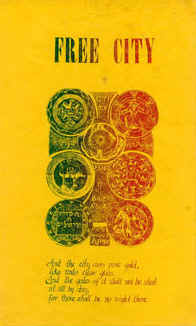A People's Hxstory of the Sixties
To assure that our hxstory survives the
inevitable tendency of revisionism, it's critically important that we grow our own
versions of what happened and why. This section of the Digger web is for
recollections, memoirs, hxstories of the Digger movement and the rise of
the Sixties counterculture.
We have six chapters from Peter Coyote's memoir of the Sixties
(published as Sleeping Where I Fall, here as Free Fall Chronicles). We
also have Ramon Sender Barayon's Home Free Home, a detailed and
beautifully written hxstory of the Morningstar and Wheeler's Ranch free
land communities. There is an article on the Artists Liberation Front, and
a section for Oral Hxstories.
For any
social movement, there is a buildup, a prelude. The San Francisco Bay area provided a
fertile ground for the growth of new movements: artistic, political,
social, and cultural. The Diggers seemed to combine all these elements in
their ideas, and presented a message that appealed to hippies and
revolutionaries, to priests as well as poets. The following topics mark the digger movement's birth and rise in the
midst of the turbulent social hxstory of the mid-to-late sixties.
Seeds (1955-65)
Sprouts (1965-66)
Flowers (1966-68)
New Seeds (1967 on)
Digger Resonance
- Food Not Bombs
- No Penny Opera
- Cloud House
- Panhandle
Free Food (Winter 1983)
- Occupy Wall Street
- Free Software Foundation
- Wikipedia
Hxstorical Praxis
- Thucydides
- With reference to the speeches in this history,
some were delivered before the war began, others while it was
going on; some I heard myself, others I got from various quarters;
it was in all cases difficult to carry them word for word in one's
memory, so my habit has been to make the speakers say what was in
my opinion demanded of them by the various occasions, of course
adhering as closely as possible to the general sense of what they
really said. And with reference to the narrative of events, far
from permitting myself to derive it from the first source that
came to hand, I did not even trust my own impressions, but it
rests partly on what I saw myself, partly on what others saw for
me, the accuracy of the report being always tried by the most
severe and detailed tests possible. My conclusions have cost me
some labour from the want of coincidence between accounts of the
same occurrences by different eye-witnesses, arising sometimes
from imperfect memory, sometimes from undue partiality for one
side or the other. The absence of romance in my history will, I
fear, detract somewhat from its interest; but if it be judged
useful by those inquirers who desire an exact knowledge of the
past as an aid to the interpretation of the future, which in the
course of human things must resemble if it does not reflect it, I
shall be content. In fine, I have written my work, not as an essay
which is to win the applause of the moment, but as a possession
for all time.
- Serendipity
- To authenticate a reminiscence, to ferret out
small facts and make large inferences, to see connections, to
ambulate mentally — these are the tasks of detectives who work
with books. The wider their frame of reference and the keener
their skills, the more productive their detection.
They need two guardians as well: a firm and unwavering skepticism
at their right hand and the Prince of Serendip at their left. Then
their adventures will be all but limitless, for the books that
possess them are the record of life itself.
—"Adventures of a Literary Sleuth" by Madeleine B.
Stern
- Ringolevio by Emmett Grogan.
|
 Cover
sheet for the first of the Free City News compilations. The Free City
Collective used the same Gestetner machines that the Communication Company
had been printing on from January to August, 1967. They published Free
City News from Fall, 1967 to Spring, 1968.
|

